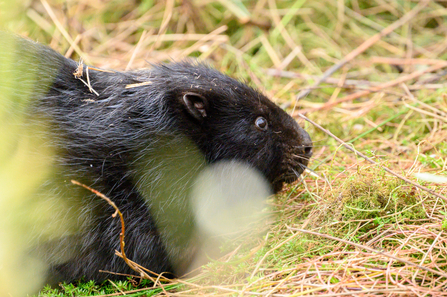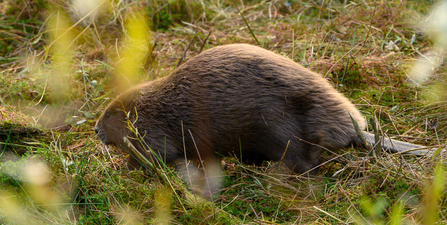
Photo © Jim Connolly Photography

Photo © Jim Connolly Photography
Today, The Wildlife Trusts and Beaver Trust are celebrating as beavers are now officially recognised as a native species in England and a European protected species. The new law, which came into force at midnight last night, is good news for this extraordinary mammal which can do so much to restore wetlands across Britain.
The Wildlife Trusts pioneered the reintroduction of beavers and are now calling for greater clarity and urgency from the Government in relation to the plans for the widespread return of the animals.
The Government published guidance in early September which outlines how beavers might be managed in the future. But both Beaver Trust and The Wildlife Trusts are concerned that it does not give sufficient support to landowners – and that the proposals lack ambition and detail. The charities warn that, in their current form, the plans will not deliver the widespread reintroduction of a species which scientific studies have shown can improve water quality in rivers, stabilise water flows during times of drought and flood, store carbon and boost other wildlife. (1)
Beavers have created green oases in our parched river valleys, because of their ability to store water through dam building and wetland creation.Harry Barton, Chief ExecutiveDevon Wildlife Trust

© Jim Connolly Photography
In 2015 Devon Wildlife Trust led a successful trial on the River Otter in Devon where England’s first wild population of beavers were reintroduced – 400 years after their extinction due to hunting and habitat loss. This trial was a great success and the Government subsequently agreed that the beavers on the River Otter could remain in the wild and spread naturally to other rivers.
In 2021, Nottinghamshire Wildlife Trust reintroduced beavers back into the area after hundreds of years of absence. The biggest group of beavers ever released in England were introduced into a 58-hectare enclosure at Idle Valley Nature Reserve. Their success and positive impact on the surrounding environment has been closely monitored since. Soon after their release, the beavers’ activity began to control the growth of invasive scrub and open up new areas of habitat for other species to benefit from.
It remains urgent and vital that the Government delivers a clear, ambitious policy and licensing guidance to support beaver restoration in the wild.Sandra King, Chief ExecutiveBeaver Trust
Harry Barton, Devon Wildlife Trust’s Chief Executive, says:
“A summer of record-breaking heat and drought has highlighted the urgency of making our landscapes more resilient to the unfolding climate emergency. Beavers have created green oases in our parched river valleys, because of their ability to store water through dam building and wetland creation. And we know they can reduce peak flows in times of flood and help improve water quality."
“The Government’s recent announcements on protection for beavers and their management are good news, but they lack clarity and a sense of urgency. We need a clear plan and timetable so these amazing animals can become part of the wildlife of rivers throughout England."
Sandra King, Chief Executive of Beaver Trust, commented:
“Beavers bring such an astonishing array of ecosystem services to our landscape, this truly is an historic day for the species in England. It is thanks to the hard work and determination of pioneering individuals and wildlife organisations that the recovery of this once-native animal is able to celebrate this milestone."
“It remains urgent and vital that the Government delivers a clear, ambitious policy and licensing guidance to support beaver restoration in the wild. At the end of the day, if we are to welcome beavers back as a native animal our primary objective must be to target positive coexistence with beavers. A properly resourced, forward looking strategy will enable land managers and communities to do this.”
If we are to welcome beavers back as a native animal our primary objective must be to target positive coexistence with beavers.Sandra King, Chief ExecutiveBeaver Trust
The Wildlife Trusts and Beaver Trust backed this call in a letter to Ranil Jayawardena, Secretary of State for Environment, Food and Rural Affairs. This asked Government to take five key actions to ensure beaver reintroductions can take place on a scale and at a pace which will bring maximum advantage to wider society.
1. Publishing an ambitious strategy and timeline for beaver reintroduction in English river catchments.
2. Reconsidering the proposals for funding beaver releases into the wild. At present these impose prohibitive levels of upfront costs on groups wanting to reintroduce beaver populations.
3. Establishing a system of financial support which will reward the farmers and landowners who provide space for beavers and their wetlands.
4. Putting in place and then resourcing a network of Beaver Management Groups across England to support farmers, landowners and local communities as new beaver populations become established.
5. Confirming the futures of existing wild living beaver populations (including the Tamar in Devon and the Stour in Kent) to add to those in the River Otter, Devon.
David Parkyn / Cornwall Wildlife Trust
Ali Morse, water policy manager of The Wildlife Trusts, says:
“The Government’s recent consultation on the future of beavers in England showed significant support for their widespread reintroduction. Of more than 3,000 responses nearly 70% were positive about Defra’s plans for the return of beavers. Even among the minority who objected the most common reason given was that the pace of Government plans for their return was too slow." (2)
“The return of beavers to rivers across England has public support and is in line with the Government's own commitments enshrined in its 25-year Environment Plan and the legally binding target of its Environment Act 2021 to halt nature’s decline. What we need now is action.”
Read more about our Nottinghamshire beavers and see the latest updates on their success!